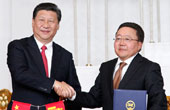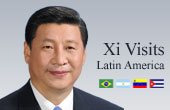Xi seeks unity in combating terrorism
Updated: 2014-09-13 03:50
By WU JIAO in Dushanbe and ZHAO SHENGNAN in Beijing (China Daily)
Comments Print Mail Large Medium SmallPresident Xi Jinping urged the Shanghai Cooperation Organization on Friday to focus more on fighting two major security issues in the region: religious extremism and cyberterrorism.
Speaking at the 14th summit of the organization in Dushanbe, Tajikistan, Xi called for an agreement aimed at curbing extremism and a mechanism for tackling the scourge of cyberterrorism.
He also urged the organization's regional anti-terrorism agency to play a greater role in tackling drug trafficking and proposed it should establish a center to meet security challenges based on a new drug mission.
Observers said Xi's proposals came at a timely juncture because security concerns could increase in the region in the wake of the US troop withdrawal from Afghanistan by the end of 2014 and in light of the continuing turmoil in the Middle East.
The proposals, if realized, would improve the organization's capability to address members' shared security problems, which threaten to undermine their top priority of development, observers said.
Chen Yurong, a senior researcher at the China Institute of International Studies, said terrorist activities have obviously increased in the region and are likely to escalate if the Afghanistan-based groups penetrate into neighboring countries.
The spread of religious extremism through the Internet to the younger generation in other countries makes things worse, Chen said.
China was hit by a slew of terrorist attacks recently. At least 323 people have died in violence linked to the Xinjiang Uygur autonomous region, which borders Afghanistan, since April last year, when the unrest began to escalate, Xinhua reported.
Wu Hongbin, former Chinese ambassador to Turkmenistan, said it is urgent for SCO members to pay more attention to drug control as opium poppy growth flourishes in Afghanistan.
"We have to cut the major source of funding for this region's terrorism groups, which is drug trafficking," said Wu. "China's Xinjiang and Central Asian countries, especially Tajikistan, are the victims when the world's largest opium producer sends its drugs out of the country."
Farmers in Afghanistan are producing more opium than ever, despite more than a decade of US forces in the country. In 2013, Afghanistan produced 5,500 tons of opium, up almost 50 percent from the previous year.
"Neither drug control nor anti-terrorism goals can be achieved in the short run, because the insurgent forces in Afghanistan are likely to bounce back after the withdrawal of US troops," Wu said. "SCO has to speed up cooperation within the group and with the other organizations before it is too late."
During his meeting with Xi on Friday, Kyrgyzstan's President Almazbek Atambayev voiced support for China's efforts to crack down on "East Turkistan" forces, the most direct terrorist threat to China. He said the country would strengthen cooperation with China.
According to a news release from the summit on Friday, leaders agreed to take measures to guarantee the safety of international information, and to fight terrorism, separatism, extremism, illegal drug trafficking and cross-border crimes.
They also voiced support for an Afghan-led and Afghan-owned reconciliation and reconstruction processes after the country held a presidential election in April that left both front-running candidates claiming victory.
Contact the writers at wujiao@chinadaily.com.cn and zhaoshengnan@chinadaily.com.cn
Big Talk






